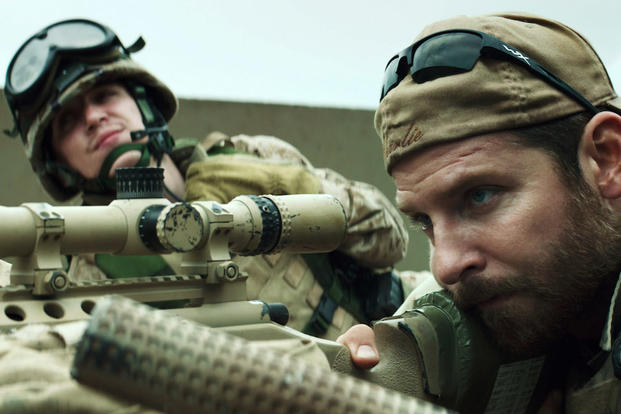”American Sniper" isn't a movie that beats around the bush. Within the first two minutes, we're alongside Navy SEAL Chris Kyle (Bradley Cooper), the "deadliest sniper in American history," staring down his crosshairs at an Iraqi woman and child who are approaching U.S. troops. Are they innocent civilians? Insurgents armed with bombs? Just as Kyle must make the decision whether or not to pull the trigger, we ask ourselves the same questions: Would we be ready to kill these people to save our comrades? And would we be ready to handle the consequences if they turned out to be innocent?
At its best, "American Sniper" sets us smack in the middle of tense moments like these, making us feel like we're in the thick of the fighting, weighing life-or-death decisions at every moment. Based on Kyle's memoirs of his life in the military, the film chronicles everything from his days as a child learning how to shoot for the first time up to his tragic death in February 2013. Unlike most modern military movies, which favor grittiness (not to mention plenty of jittery handheld cameras) over straight storytelling, "American Sniper" is filmed in a classical style, with the focus on actors -- no surprise given that the director is Clint Eastwood.
Above all, the film is a showcase for the buffed-up Cooper, who is in nearly every frame and holds it all together with a powerful performance as Kyle. Living up to the "American" in "American Sniper"'s title, Cooper presents him as an idealized version of what we would like to be: a decent, down-to-earth man looking to do right by country and family. On paper that may sound too good to be true, but Cooper's self-effacing, understated characterization humanizes Kyle -- in the clench of his jaw and his watchful eyes, we can see a man still susceptible to doubt and stress, even as he pulls off the acts that will earn him recognition from his comrades and fear from his enemies.
It's been said that Eastwood would have been Kyle's choice to direct the film about his life, and it's easy to see why. As he is presented in the film, Kyle has the qualities of a standard Eastwood hero: he's a top-notch professional of wry wit and few words, doing unpleasant things to protect home and hearth. "American Sniper" also has the rhythms of a Eastwood Western -- it's not too difficult to see the troops as gunfighters venturing out into the wild and risking their lives against the "savages" (Kyle's term for the enemy combatants in his book), and we also get an Alamo-like climax with Kyle and his unit perched on a rooftop fending off the bad guys from all sides while his steadfast wife Taya (Sienna Miller) and family anxiously await him at home. We also get a mano-a-mano showdown between Kyle and his counterpart Mustafa (Sammy Sheik), a Syrian sniper working for the Iraqi insurgents who is nearly Kyle's equal in skill (in real life, Mustafa existed but Kyle wasn't the one to bring him down).
”American Sniper" is a polished production and is paced well over its 2+ hour running time, but it has its problems. Those who have read the book might find themselves missing some of the detail and rawness from the printed page, as the film simplifies and compresses events in order to move things along. Others might find that Kyle's struggles with PTSD and his subsequent rehabilitation, which form the emotional backbone of the story, get short shrift compared to the extensive war scenes. There's a fair number of moments that are right out of the Hollywood screenwriting playbook (when one of Kyle's buddies talks about how he's going to propose to his gal back home, you can be sure that he is not long for this world). Speaking of clichés, Sienna Miller does the best she can with a one-note role, playing the neglected spouse you've seen in plenty of cop and military dramas ("Even when you're here, you're not here," she sighs). The movie also has a streamlined view of the war in Iraq, with the bad guys and good guys relatively easy to differentiate. Whatever the faults of a movie like "The Hurt Locker," you could argue that it brings a more realistic view of life in the war zone, where chaos is always around the corner, and shades of gray always threaten to obliterate ideas of black and white.
Still, Eastwood has too much integrity to glamorize combat, and "American Sniper" accomplishes what it sets out to do -- provide a tribute to the life of a service member, and the personal sacrifices he makes in order to get the job done -- with low-key style. If nothing else, see the film for Cooper's performance, and ask yourself the tough questions he asks himself when he’s lying on the rooftop, staring down the scope of his rifle.














